Key Takeaways
- Inflation has dramatically accelerated for the first time in 40 years. Most equity and fixed-income markets have declined in response, with fears of a recession mustering (with the notable exception of energy stocks).
- U.S. technology stocks are at the epicenter of the selloff, while government bonds have exhibited a marked lack of defensiveness. Corporate bonds are falling too, perhaps marking a change in the behaviour of bond markets from an inflation angle to one of recession.
- As markets have sold off, we have continuously reassessed positioning, taking stock of valuations and weighing the potential for a range of different outcomes. China looks attractive from a valuation perspective, despite notable risks, while we’ve also edged into U.S. stocks, broadly speaking, as the market has fallen.
- Our principles: stay true to the process; recognise uncertainty for what it is; remain focused on fundamentals; and utilise periods of uncertainty to consider implications for portfolio positioning.
What’s Happened Thus Far
As the saying goes, what a year this week has been. So far in 2022, it’s been a lot. Inflation, for the first time in 40 years, has dramatically accelerated—whether it’s the monthly consumer price index or longterm expectations embedded in bond markets. War, with its attendant human costs as well as worries over the global supply chain, asserted itself on the global psyche. Interest rates, at least partly in response to inflation and the expected trajectory of policy rates have risen sharply. Fears over slowing economic growth heightened speculation of the dreaded stagflation. A bear market in equities and fixed income spared few investors as many common volatility measures skyrocketed.
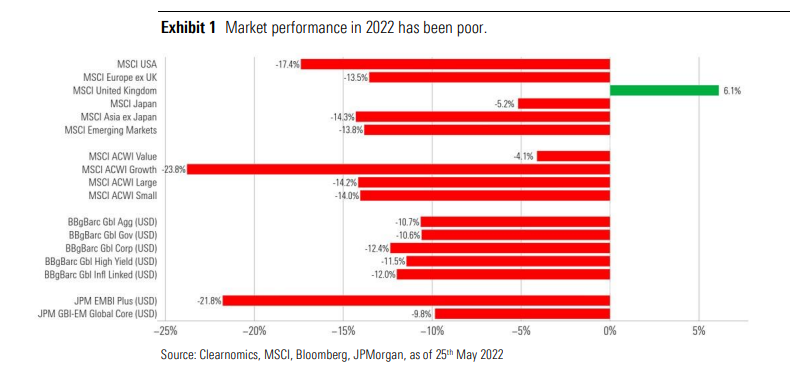
Digging further into the market backdrop thus far in 2022, most broad-equity and fixed-income markets declined year to date, as markets grappled with the reality of higher interest rates and the potential knock-on effect on economic growth. The notable exception from the selloff, energy stocks—a key overweight position across many of our portfolios—benefitted from rising oil prices amid the postpandemic economic recovery and the Ukraine-Russia conflict.
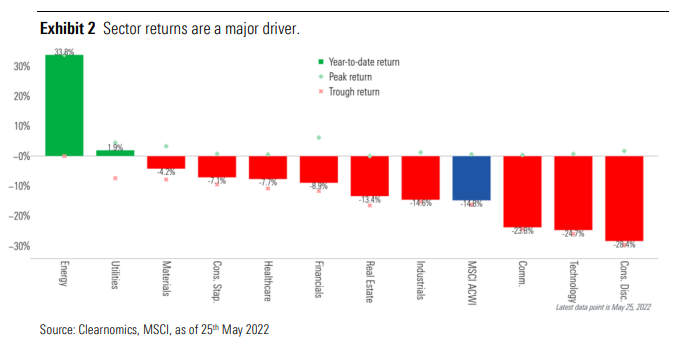
Large-capitalisation technology shares in the U.S. market (“Big Tech” stocks), which have dominated market performance for the past decade, have been at the epicentre of the market selloff as a doublewhammy of rising borrowing costs and the prospect of slower growth disproportionally impacted assets whose cash flows are far out in the future. The S&P 500 Communication Services Index, which includes stocks such as Alphabet, Meta, and Netflix, has given up 24.2% so far in 2022. We have previously cautioned investors about the potential valuation and market concentration risk posed by these stocks and have generally been underweight U.S. stocks going into this downturn.
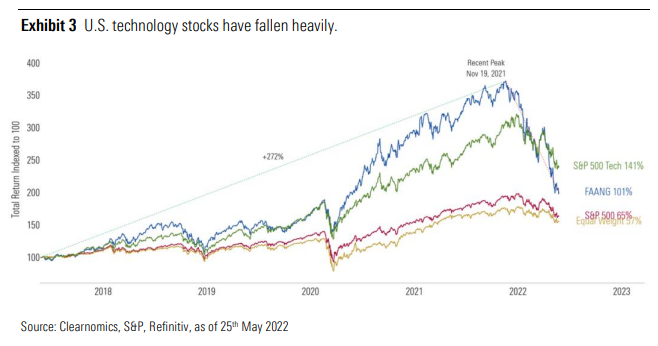
Also notable during 2022 has been the lack of defensiveness of government bonds, particularly those with extended maturities. Investors had come to expect that treasuries would be a source of portfolio ballast during periods of equity market uncertainty—and this was certainly the case during the significant equity market selloff in response to the advent of the COVID-19 pandemic early in 2020. With the benefit of hindsight, it has become clear that the regime, or backdrop of policy-rate accommodation, significantly aided treasury returns during that time frame. With the prospect of rising treasury rates in anticipation of higher policy rates as central banks grapple with inflationary pressures, the regime has shifted from one of prevailing tailwinds to one of prevailing headwinds, at least for the moment.
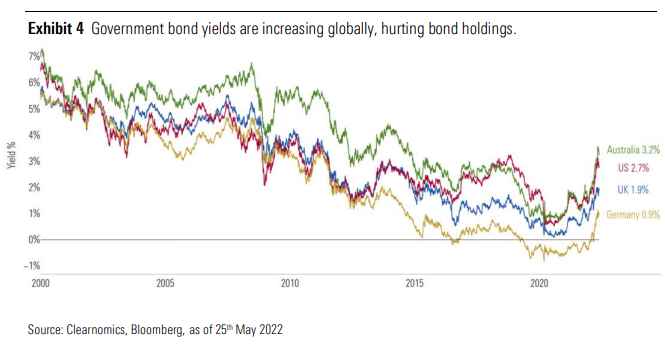
Positioning: Then and Now
Heading into 2022, we had three concerns, two of which were interrelated. First, as valuation-conscious investors, the sky-high—at least in our estimation—price tags of U.S. stocks were worrisome. This was a view we had held for several years, rather painfully, and was particularly true among the FAANGM stocks (Facebook/Meta, Apple, Amazon, Netflix, Google/Alphabet, and Microsoft), which had dominated the market for several years and had a particularly strong stretch during pandemic lockdowns.
Meanwhile, stocks from the U.K, Europe, Japan and even emerging markets, while not cheap on an absolute basis, looked attractive relative to the U.S. market. We also preferred value segments of the equity market (particularly energy and financials companies) over heated areas like U.S. technology. These views have moderated as valuation pressures have subsided, but areas of particular interest continue to include the U.K., European financials, Brazil, Mexico, and China.
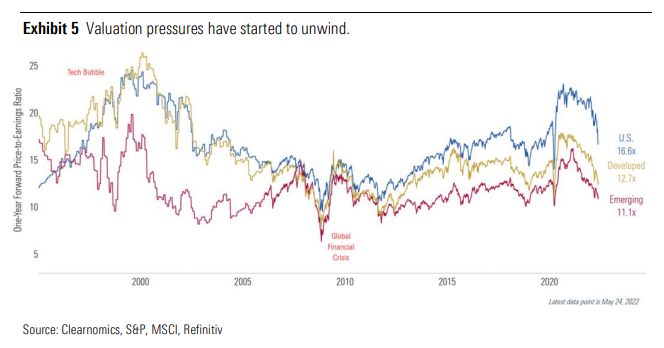
In addition to valuation concerns, we were leery of the macroeconomic environment. We don’t spend much time forecasting inflation or interest rates—few investors, if any, have proven prescient in those estimations—but given fiscal and monetary policy, supply bottlenecks, and the unprecedented global stop/start of health policies, the range of outcomes for inflation seemed particularly wide. The follow-on, of course, was the impact on interest rates and how central banks might respond to persistently high inflation. This was particularly worrisome to us, given the low yields across fixed income, which seemed vulnerable to negative surprises.
Inflation and interest-rate concerns reinforced our preference for value-oriented equities over their growthier counterparts. While the driving appeal of value stocks is their price relative to fundamental value—and often a higher yield, either through dividends, buybacks, or both—growth stocks excite investors because of their high forecasted earnings streams. Because investors value these stocks by discounting those earnings into the present with interest rates, higher interest rates can undercut their appeal.
One exception to this preference in our portfolios were Chinese stocks, particularly in the technology sector. A host of concerns had weighed on these stocks over the past year, including an unpredictable regulatory environment. As a result of the negative sentiment, Chinese technology valuations looked far more reasonable to us, and we had initiated small positions in the country.
Within fixed income, we had recognised the embedded vulnerability to rising interest rates, so carefully managed against a credit shock and duration. We did, and continue to, like government bonds for their defensive properties and enhancing total portfolio robustness, despite short-term headwinds in a high inflation scenario.
While this positioning hasn’t mitigated all losses through a difficult period, it certainly has helped our relative results, particularly given the sell-off within U.S. technology. That said, emerging markets have been a pain point as geopolitical tension and renewed COVID lockdowns in China have added to investors’ concerns. Ditto with European stocks more closely tied the Russia/Ukraine war, including Germany and European financials.
As markets have sold off, we have continuously reassessed positioning, taking stock of valuations and weighing the potential for a range of different outcomes. From a valuation perspective, China looks even more attractive—but we acknowledge risks given the tremendous regulatory and geopolitical uncertainty. We’ve also edged into U.S. stocks broadly as the market has continued to fall, though valuations remain high, in our estimation.
Our fixed-income positioning remains largely intact, with government bonds playing a prominent role, though we continuously reassess valuations in corporate markets as well. We are getting more interested in higher yielding bonds, as these look like attractive entry points despite the inflation and recessionary fears. Our allocations today broadly help offset recession risk.
Guiding Principles for All Market Conditions
This conversation naturally leads into a discussion of how we manage portfolios through uncertainty, which, while always present, feels particularly high today. Will inflation grind higher or moderate? Will the Federal Reserve be able to thread the needle, attacking inflation but leaving growth untouched, thereby avoiding a recession? And if that’s not enough, how will China navigate COVID, and what will be the long-term outcome of the Russian/Ukrainian war?
At Morningstar Investment Management, we adhere to a few principles that we believe will help us accomplish our overall objective of satisfactory long-term investment results on behalf of our clients. First, we believe that in any investment climate, but most importantly during periods of uncertainty, you need to stay true to your process. For us at Morningstar Investment Management, this means sticking with our long-term, valuation-driven, independent-minded, behaviourally-aware approach towards investing. Our decision process requires time, thought and thoroughness, and this means we won’t capture every short term trading move but should, over time, be able to identify and capture suitable long-term opportunities during periods of uncertainty.
Second, we believe it is a prudent strategy to recognise uncertainty for what it is. A hallmark of our process is the emphasis on planning over prediction. We do not consider it to be a core competency to be able to predict market movements, but we can build out scenarios in our analysis and test investments to understand their behaviour under different conditions. As well, our valuation-driven approach seeks to build in a margin of safety in our analysis in order to account for uncertainty.
Third, we believe it is vitally important to remain focused on fundamentals—and how periods of uncertainty impact those fundamentals. We are constantly researching sectors, countries, and asset classes that are impacted by these uncertainties, with the goal of reviewing and refining the assumptions underpinning the long-term fair values that inform our view of expected returns.
Fourth, we believe it is important to utilise periods of uncertainty to consider implications for portfolio positioning. As we think about the portfolios we build on behalf of our clients, the concept of robustness is highly emphasised in that thought process. What we mean by robustness is the ability of a portfolio to deliver a return stream that is competitive when markets are accommodative and holds value comparatively well during periods of turbulence. Delivering robust portfolios is especially important during periods of uncertainty, as a critical element of our approach is to help keep our investors in the game—to stay invested. With this in mind, from a portfolio perspective, we utilise periods of uncertainty to monitor and review portfolios to ensure that our response to changes in valuation levels is measured and thoughtful.
Overall, while periods of uncertainty are certainly not pleasant, they do often unearth potential opportunities. By sticking with our process—recognising uncertainty for what it is, keeping our focus on fundamentals, and always being mindful of our portfolio positioning—we believe that our chances of identifying and profiting from these opportunities are greatly improved.
Morningstar Disclaimers:
Since its original publication, this piece may have been edited to reflect the regulatory requirements of regions outside of the country it was originally published in. The Report is distributed by Morningstar Investment Consulting France SAS, authorised by the ACPR. Registered identifier 89634.
The opinions, information, data, and analyses presented herein do not constitute investment advice; are provided as of the date written; and are subject to change without notice. Every effort has been made to ensure the accuracy of the information provided, but Morningstar makes no warranty, express or implied regarding such information. The information presented herein will be deemed to be superseded by any subsequent versions of this document. Except as otherwise required by law, Morningstar, Inc or its subsidiaries shall not be responsible for any trading decisions, damages or losses resulting from, or related to, the information, data, analyses or opinions or their use. Past performance is not a guide to future returns. The value of investments may go down as well as up and an investor may not get back the amount invested. Reference to any specific security is not a recommendation to buy or sell that security. It is important to note that investments in securities involve risk, including as a result of market and general economic conditions, and will not always be profitable. Indexes are unmanaged and not available for direct investment.
This commentary may contain certain forward-looking statements. We use words such as “expects”, “anticipates”, “believes”, “estimates”, “forecasts”, and similar expressions to identify forward-looking statements. Such forward-looking statements involve known and unknown risks, uncertainties and other factors which may cause the actual results to differ materially and/or substantially from any future results, performance or achievements expressed or implied by those projected in the forward-looking statements for any reason.
The Report and its contents are not directed to, or intended for distribution to or use by, any person or entity who is a citizen or resident of or located in any locality, state, country or other jurisdiction where such distribution, publication, availability or use would be contrary to law or regulation or which would subject Morningstar or its subsidiaries or affiliates to any registration or licensing requirements in such jurisdiction.
MeDirect Disclaimers:
This information has been accurately reproduced, as received from Morningstar, Inc. No information has been omitted which would render the reproduced information inaccurate or misleading. This information is being distributed by MeDirect Bank (Malta) plc to its customers. The information contained in this document is for general information purposes only and is not intended to provide legal or other professional advice nor does it commit MeDirect Bank (Malta) plc to any obligation whatsoever. The information available in this document is not intended to be a suggestion, recommendation or solicitation to buy, hold or sell, any securities and is not guaranteed as to accuracy or completeness.
The financial instruments discussed in the document may not be suitable for all investors and investors must make their own informed decisions and seek their own advice regarding the appropriateness of investing in financial instruments or implementing strategies discussed herein.
If you invest in this product you may lose some or all of the money you invest. The value of your investment may go down as well as up. A commission or sales fee may be charged at the time of the initial purchase for an investment. Any income you get from this investment may go down as well as up. This product may be affected by changes in currency exchange rate movements thereby affecting your investment return therefrom. Any decision to invest should always be based upon the details contained in the Prospectus and Key Investor Information Document KIID), which may be obtained from MeDirect Bank (Malta) plc.

